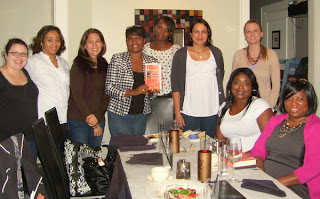I had the pleasure of participating in the Women's Brookhaven / Buckhead Book Club (that's me in the tan sweater!) to discuss "The Immortal Life of Henrietta Lacks" by Rebecca Skloot yesterday. The meeting was at Mosaic, a great cafe / bistro near the Buckhead Diner.
I was excited to hear a discussion around this book. The fact that the book is non-fiction and ethically controversial made me wonder if it would be like college discussions where each side dug in their heels and didn't listen to much their opponents had to say. I was interested to know how readers may have interpreted situations differently from me (I enjoy an opposing viewpoint sometimes to merely present a previously unknown angle to me.)
When I read the book it was sad and frustrating. I was constantly comparing it in my mind to "The Spirit Catches You and You Fall Down," which was my first foray into a family's medical journey conflicting with medical protocol. Ethics is a constantly evolving field and obviously there will be those patients who fall just short of or are the springboard for establishing guidelines. Henrietta's cancer cells were cultured and went on to create the most prominent cell line for scientific research. Unfortunately, she gave no consent for their use and her family was not notified for 20 years. The fact that Henrietta was an under-educated, low-income, "colored" woman being treated free of charge at Johns Hopkins in the 50's meant that she was not even presented with the option.
We discussed what could be done to rectify the situation now and agreed that the Lacks family or a foundation should receive a percentage of every vial of HeLa sold from this point forward and the immediate family should be given complimentary health care and and educational scholarships.
While the book makes the reader consider how ethics have changed in the last 60 years, it also gets your imagination wandering to all the future possibilities. We discussed how we rarely read the fine print on medical consent forms, the new push for harvesting umbilical cord blood, and the changing concept of doctor as omnipotent being.
An entire course could be built around this novel and medical ethics, but we only had an hour or so to touch on the main points. We all agreed that Rebecca Skloot was a patient, unbiased, organized reporter and are thankful that she let the whole world know who HeLa really was.



No comments
Post a Comment